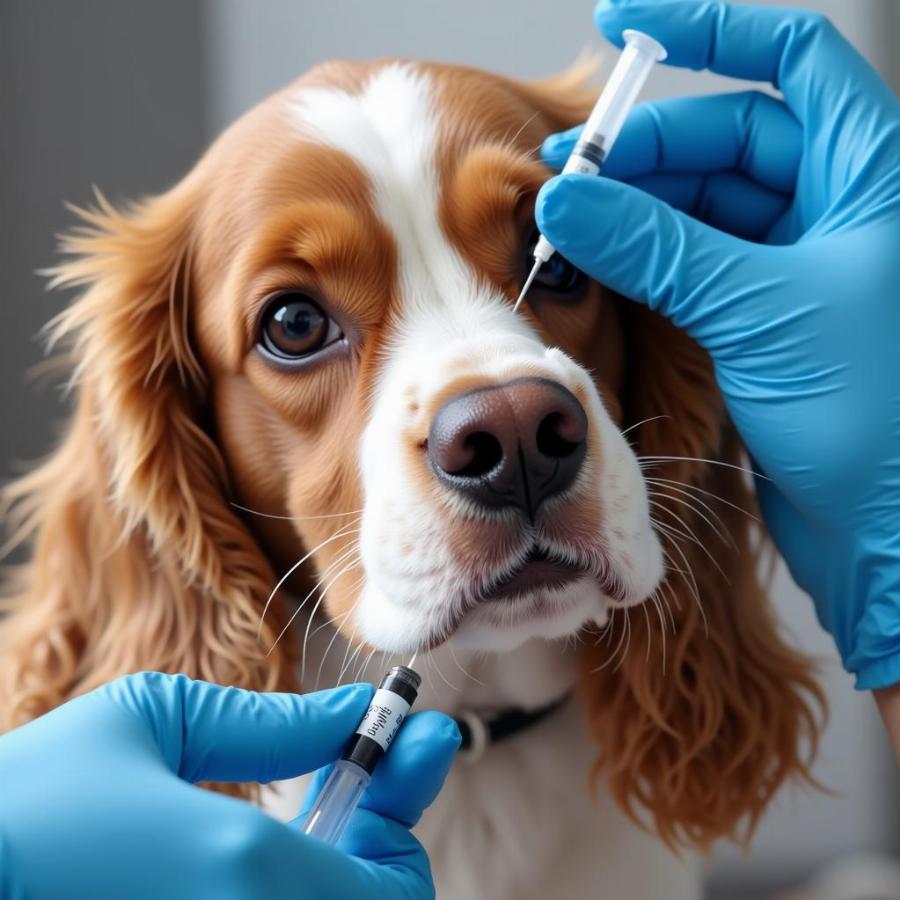Diarrhea is a common problem in dogs, characterized by loose, watery stools. It can be caused by a variety of factors, ranging from dietary indiscretions to serious underlying medical conditions. As a responsible dog owner, it’s essential to understand the potential causes of diarrhea in dogs so that you can seek prompt veterinary attention when needed and help your furry friend feel better soon.
What Causes Diarrhea in Dogs?
Dog diarrhea can be attributed to several factors, some more serious than others. Here’s a breakdown of the most common culprits:
Dietary Indiscretions
Just like humans, dogs can experience digestive upset from eating something they shouldn’t.
- Garbage Gut: Raiding the trash can, indulging in table scraps, or snacking on spoiled food can lead to a case of “garbage gut.”
- Dietary Changes: Suddenly switching your dog’s food or introducing new treats can disrupt their digestive system, causing diarrhea.
- Food Intolerances & Allergies: Some dogs are sensitive or allergic to certain ingredients, leading to digestive upset, including diarrhea. Common culprits include dairy, wheat, soy, and certain protein sources.
Infections
Viral, bacterial, and parasitic infections can all cause diarrhea in dogs.
- Viral Infections: Canine parvovirus, distemper, and coronavirus are common viral culprits, often accompanied by other symptoms like vomiting, lethargy, and loss of appetite.
- Bacterial Infections: Salmonella and E. coli are examples of bacteria that can cause diarrhea in dogs, often contracted through contaminated food or water.
- Parasites: Intestinal parasites like roundworms, hookworms, whipworms, Giardia, and coccidia can wreak havoc on a dog’s digestive system, leading to diarrhea.
Other Medical Conditions
- Inflammatory Bowel Disease (IBD): This chronic condition involves inflammation of the digestive tract, leading to persistent diarrhea, vomiting, and weight loss.
- Pancreatitis: Inflammation of the pancreas can cause digestive enzymes to leak into the surrounding tissues, leading to severe abdominal pain and diarrhea.
- Kidney & Liver Disease: These organs play a role in digestion and waste removal, so problems with either can manifest as diarrhea.
- Medications: Certain medications, like antibiotics, can disrupt the balance of bacteria in the gut, potentially leading to diarrhea as a side effect.
When to Worry About Diarrhea in Dogs
While a single episode of loose stool might not be cause for immediate alarm, it’s crucial to monitor your dog for any worsening symptoms or concerning signs. Contact your veterinarian immediately if:
- The diarrhea is severe or bloody.
- Your dog is also vomiting, lethargic, or has a loss of appetite.
- There are signs of dehydration, such as sunken eyes, dry gums, or decreased skin elasticity.
- The diarrhea lasts for more than 24-48 hours.
- Your dog is a puppy or senior, as they are more vulnerable to dehydration and complications.
Tips for Preventing Diarrhea in Dogs
- Vaccinate & Deworm Regularly: Keep your dog up-to-date on their vaccinations and deworming schedule to protect them from common parasites and viruses that can cause diarrhea.
- Practice Good Hygiene: Wash your hands thoroughly after handling your dog’s waste and before preparing their food to prevent the spread of bacteria and parasites.
- Avoid Feeding Table Scraps: As tempting as it may be, resist the urge to share your food with your dog. Stick to a balanced diet formulated for their life stage and breed.
- Introduce New Foods Gradually: When transitioning to a new food or introducing new treats, do so slowly over several days to minimize digestive upset.
- Secure Your Trash: Invest in a dog-proof trash can to prevent your furry friend from accessing potential dietary disasters.
- Be Mindful of Potential Toxins: Keep harmful substances like medications, cleaning products, and toxic plants out of your dog’s reach.
 Dog Receiving Dewormer Medication
Dog Receiving Dewormer Medication
Beaut Dogs: Your Partner in Canine Care
Beaut Dogs is your go-to source for reliable and comprehensive information on all things dog-related. We’re dedicated to providing insightful guides on dog breeds, health, nutrition, training, and more, empowering you to be the best pet parent you can be. For personalized support and expert advice, reach out to us at [email protected].
Remember, this article provides general information and shouldn’t be considered a substitute for professional veterinary advice. If your dog is experiencing diarrhea or any other health concerns, consult your veterinarian for a proper diagnosis and treatment plan.